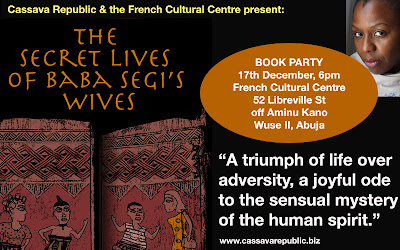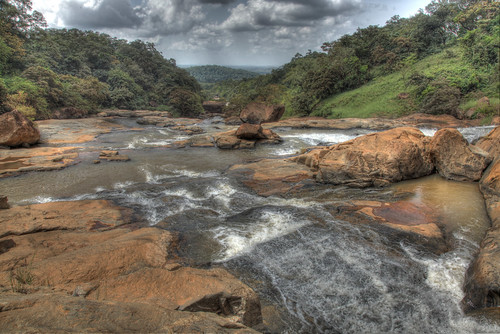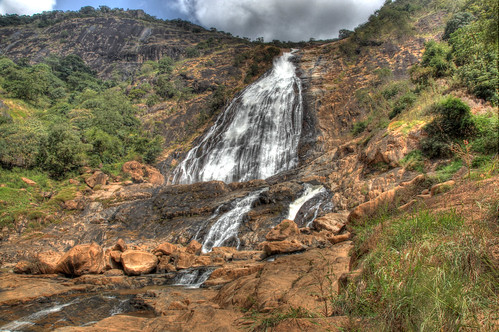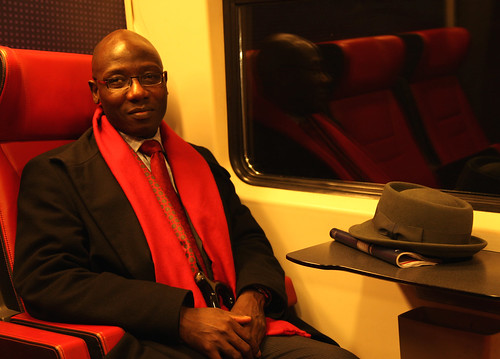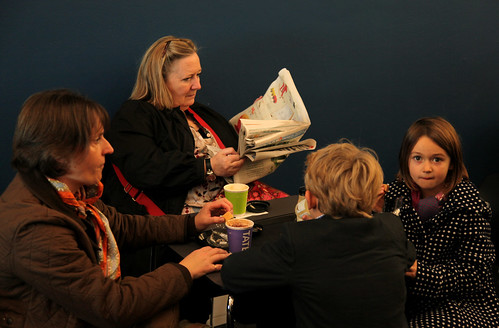The palm wine was scooped out into large calabashes, which were then given to those with sufficient thirst to outweigh any embarrassment one might feel at tilting a large bowl of alcohol facewards in public view. I took mine in libation to the Gods of the Middle Belt, for surely; Abuja is neither of the North, nor of the South. Insects panicked their way away from the liquid, drunk and hopeless in their plight. Nearby, the band members were dressed in medieval Naijaware, as if a jousting tournament for Henry VIII were being put on half a millennium after the fact in West Africa. The music was quirky; milliki music in English and Spanish and then Yoruba and Igbo, with references to Commandante Che as a Cuban rhythm kicked in. There was brass and dundun and a synthesiser: good Nollywood meets juju for an enlightened consciousness.
We were waiting for Kayode Fayemi, the new Governor of Ekiti State and his wife Bisi. In the house, or rather, the garden, of the Yar’Adua Centre in the lee of the Sheraton, were many of the activists who had helped support Fayemi through the dark days of the past three years, when all seemed lost to thuggery, darkness and primeval do-or-die politics.
First to speak was Jibrin Ibrahim, of the Centre for Democracy and Development in Abuja, which functions as a finishing school for young ‘uns who go on to play leading roles in civil society organisations in Nigeria. He alluded with delightful sarcasm to a ‘grand theoretician’ of electoral practice, one Olusegun Obasanjo, and his unique concept of the ‘community vote’, which, strangely enough, does not appear in the theoretical literature. He then discussed the moral fraud of first-past-the-post, as evidenced in the UK – as a signpost for future reform in Nigeria, when counting becomes a little more scientific. Pausing for a moment, he delved into the caverns of his memory to describe what happened in the Ondo State elections in 1983 as the first instance of a ‘digital election’ – when the archaic analogue practice of counting is put aside in favour of pure fabrication. Jibo then segued seamlessly to a discussion on the sociology of electoral behaviour in the context of a post unity-party return to ethnic-based voting (Dora to the East, Buhari to the North etc.). It was a compelling disquisition.
There followed a talk by a Senior Advocate of Nigeria (SAN) – I didn’t catch his name – who was closely involved in the Ekiti Appeal which led to the former governor Segun Oni being removed just two months ago. The learned SAN talked about the critical role courage and determination played in the pursuit of electoral justice in Ekiti State. The 41-month legal battle had indeed been epic and dramatic. The full story has yet to be recounted; when it does, it may involve as much gore as triumph, narrating an extraordinary pursuit of electoral justice in the face of extreme pressure, financial and otherwise. If ever there is a film, it would make Cory Booker’s redemption song in Newark look like a kindergarten at Christmas.
The story of Ekiti in 2010 shows that the moment Nigerians are prepared to go all the way for their political beliefs, electoral justice has a fighting chance. It’s a Hegelian story of the dialectic in a sense, as told in those few pages the German philosopher wrote on Lordship and Bondage in the Phenomenology of Spirit. The slave who no longer fears death can conquer his master, who depends on the slave and does not want to die. Class consciousness becomes a dynamic in society; social change becomes likely, if not necessary. There is a sense in which many States are in a similar situation to Ekiti. The elections in 2011 should be interesting!
Finally, just before ten, the entourage arrived, hours late thanks to Arik, an airline that will not be rushed in its task of delivering passengers from one place to another. There was the usual swarming buzz of excitement as the group arrived, although the movement was gentler and more fluid than the circus scrum we have come to know through the PDP; the locust lure of cubic metres of money at hand was absent. Egghead, Naija’s twitter supremo, was in the pack, lolloping at the back, phone in hand, thumbs atwitching. A few more introductory remarks were made, including some words by the ever-graceful Amina Salihu, followed by an emotional Odia Ofeimun, speaking as if through the lens of a lifetime of disappointed dreams.
One sensed a slight awkwardness among many at referring to Kayode as “Your Excellency” and the like; for those gathered, this is a man with whom they have eaten and drank and known as “Kay” for all their lives. The awkwardness had been offset spatially from the outset; there was no ‘high-table’ at this gathering. The compere had referred at the beginning to an avoidance of hierarchies in the designation of a ‘middle table’. Around this place there was a ceremony with kola nuts, which were held in a bowl as Odia intoned, and then handed around. Kayode seemed unsure how the ritual was supposed to work. The need to articulate the solemn joy of the moment became adrift in a post-colonial indeterminacy and the cultures either side of the Niger.
In these moments, it’s possible to note the expectations that foster and constitute the paraphernalia of power in Nigeria. There must be a swarm; there must be a ceremony; there must be grandeur; there must be ritual. Bring on the garlands and the yards of cloth. And yet, among people who have spent their lives struggling for justice, these things become diluted to the point of meaninglessness. Perhaps this is what the verge of modern politics always looks like. Apparently President Jonathan has expressed frustration over the size of the convoys and the redundant need to freeze cities into gridlock during his visits. The juggernaut of sycophancy takes a while to hit the brakes, no matter where it rides and who is holding the wheel. Those in power can hardly be blamed when the pressures of expectation in favour of a monarchic pomposity intensify yet again in the grounds of the temple.
Finally, we heard the couple speak. Bisi Fayemi took the microphone first. She spoke with crystalline clarity of the need to never give in to either fear or lassitude, and the urgency of occupying and contesting the space of politics. Activism should never be contented with a ringside seat, she declared. Her voice had tuned in to the frequency of courage. Feminism vibrated in the air as she closed with an aluta continua and a dedication to serve those in Ekiti.
One of his friends, Dr Chidi Anselm Odinkalu, provided the final introduction to Kayode, mentioning the need to ‘hold his feet to the fire’. This brought the purpose of the gathering to its nub: we will celebrate you and we will support you and we will remind you of your purpose at every step. And we will not let you forget, and you will not walk alone. And then Kayode spoke. He began by talking about the time he decided to go into politics and challenge for the governorship of Ekiti. People had asked him at the time how he could possibly win without money. He hinted at the immensity of the struggle since that time and the need to see politics as a form of activism (in an echo of his wife). Again, we await the book and perhaps the film.
Moving on to business, Kayode outlined his two legislative priorities: Freedom of Information and Fiscal Responsibility. As he spoke, I could not imagine a better starting programme of legal change. After a passing reference to the need for judicial reform, he spoke of the need to end the backbreaking suffering of subsistence farming, the livelihood of most of the people in his state (and indeed, the country). He outlined his plans to develop commercial farming, to feed the nearby Lagos metropolis, a market he estimated at three billion naira per day. He also assured the audience that the horrible roads into the State would be fixed within six months. It sounds like a feasible and achievable platform to supersede Fashola as the most popular Governor in Nigeria, providing service and accountable leadership to the people.
The first avowedly feminist governor in Nigeria is now looking ahead to the next four years, and of building what he refers to a “model state” in Ekiti. In his work, he is certain to get support from across the world. Already, the World Bank and DFID have declared an interest. The purpose will be to move away from dependency on oil revenues from Abuja, to build a state that thrives on its own steam.
After the national anthem, the entourage slowly melted away. Kayode and Bisi made a beeline for Bibi and I, and the four of us held each other for a brief moment for a photograph. It was a shock and a surprise to find out he reads my blog. It felt like being a part of a new history for Nigeria. Good people, good times ahead.
Read more...





